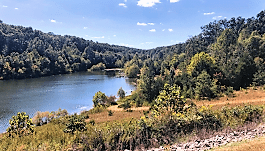CECorps helps rural community prepare for cleaner, safer water
September 7, 2022

AWWA Articles
CECorps helps rural community prepare for cleaner, safer water
Note: Members of Community Engineering Corps (CECorps), AWWA’s Kentucky/Tennessee Section, and Engineers without Borders (EWB) Buffalo Chapter developed the following article. CECorps brings underserved communities and volunteers together to advance local engineering solutions through its alliance partners AWWA, EWB and American Society of Civil Engineers (ASCE).
Nestled in the mountains just west of Nashville, Tenn., there’s a quiet community where nearly 500 residents enjoy lush natural surroundings and the calmer pace of rural life. However, life in this idyllic setting comes with some challenges, notably water. (Pictured below, mountain lake in Tennessee.)
 Originally built as a summer vacation campground on 1,500 acres, this dispersed community now comprises roughly 200 year-round households. The water infrastructure includes four public bathhouses, each with a well and septic system. Just under 70 homes have private wells, and the water quality from these wells varies widely. For the vast majority of residents, the bathhouses provide their only access to potable water and sanitation. Multiple daily bathhouse trips to fetch or use water are routine.
Originally built as a summer vacation campground on 1,500 acres, this dispersed community now comprises roughly 200 year-round households. The water infrastructure includes four public bathhouses, each with a well and septic system. Just under 70 homes have private wells, and the water quality from these wells varies widely. For the vast majority of residents, the bathhouses provide their only access to potable water and sanitation. Multiple daily bathhouse trips to fetch or use water are routine.
The community’s average household annual income is just $31,000. Many residents rely on public assistance. Still, some households have been spending as much as $250 per week to purchase clean water from outside the community — demonstrating both the high priority that some residents place on water and the financial burden that lack of clean, safe water can create. Improving this community’s water system and extending it to serve all homes would be a major undertaking, requiring substantial resources and expertise that this community lacks.
In recent years, pressure to improve this water system has mounted. As the permanent population grew, state environmental officials began to question this community’s original permits for a transient-use water system. Also, more than half the residents of this community are children, so the water problems began attracting attention from child welfare agencies.
CECorps on the ground
CECorps was able to help this community make significant progress toward the goal of equitable, convenient access to clean water and sanitation. This alliance between AWWA, ASCE and EWB USA assists U.S. communities that need, but cannot afford, engineering services to solve community problems. Volunteer engineers collaborate with community members and local organizations to design appropriate local infrastructure solutions.
CECorps dispatched a team of volunteer professional engineers to assess the community’s water system and needs. They collaborated with the local branch of the nonprofit Rural Community Assistance Partnership (RCAP) — specifically, working with technical assistance providers from Communities Unlimited (CU). Through a longstanding relationship, CU has been providing technical, financial, and managerial capacity building for this community. CU brought this project opportunity to CECorps, and the CECorps team relied on CU to gain a deeper understanding of the community and its challenges.
The end result of these efforts was an engineering report that will be essential to obtaining project funding and implementation support.
CECorps volunteers did a site visit in late 2019. “At the bathhouses, we saw people filling water tanks to bring back home, and we saw areas of potential cross-contamination with sewage disposal,” said Taylor Brown, an engineer with the public works department of the City of Buffalo, N.Y. “Also, a fire started while we were there. Fire services are so far away that, without a proper on-site water source, several structures have burned down in recent years. Seeing all that in one day was a lot. We weren’t sure what to start with.”
Volunteer Miranda Cordiale, a water engineer with Arcadis, accompanied Brown on that CECorps site visit. “We drove around the community and talked to a lot of residents about their life experience. Most of them were working-class, very kind people. They’d been economically displaced from the nearby big city,” she said. “Other nearby communities didn’t want them to connect to their water infrastructure, or such connections weren’t possible due to topography. An underground water trade had sprung up, where some residents delivered water to others, but sometimes that water was getting contaminated with E coli in transit.”
“One key resource this community lacked was skilled people who could keep the existing water system running safely and reliably,” said David Powell, a water resources engineer for Woolpert, the lead engineer for this CECorps project. “One resident knew the basics of how to run a water system and do operator testing, but he had to stop due to health issues. The property owners association contracted testing out to a community down the road — but at the time we were there, there was nobody on-site who could handle maintenance.”
Education, organization, motivation
 Working closely with CU’s technical assistance providers, the CECorps team crafted an engineering recommendation that was scaled and appropriate to this community’s organizational capacity. A major success of this project report was that CECorps was able to go beyond addressing physical infrastructure needs. The team also provided managerial and organizational recommendations to help ensure sustainable water supply management.
Working closely with CU’s technical assistance providers, the CECorps team crafted an engineering recommendation that was scaled and appropriate to this community’s organizational capacity. A major success of this project report was that CECorps was able to go beyond addressing physical infrastructure needs. The team also provided managerial and organizational recommendations to help ensure sustainable water supply management.
“This community used to be really stuck, just looking down the road at a void. They didn’t know how much fixing their water system would cost or how to get it done,” said Powell. “That’s why our report recommended more than technical measures. We also suggested an organizational structure to bill for water, and to enable people’s voices to be heard as issues arise.”
The process of compiling this report helped the community focus and organize. Volunteers asked questions that sparked important conversations in the community. The property owners association appreciated CECorps’ guidance and support to address such a daunting, complex, and highly technical issue.
“We did a lot of education about why safe, clean water is so important, and how to achieve it,” said Powell. “It can be really hard to prioritize what’s best for the long term when most people are just getting by week-to-week. But this community has a lot of kids. Family is very important here. That core value helped motivate residents to pull together on this issue.”
An engineering report is just one milestone on the path to clean, safe water. However, all other progress toward that goal depends on this report. “Many communities miss out on grants to rebuild their infrastructure because they can’t afford to hire an engineer to write the report, or to pay someone who understands the grant process,” Powell observed.
It may be years until this Tennessee community can break ground on their improved water system. But now they have a clear vision of that goal, and a path forward. They’ve made important connections, and they have the information they need to work with grantors, government, and construction companies to move this project forward. CECorps volunteers boosted this momentum and are moving on to assist more communities in need.
Volunteering with CECorps
The time commitment for CECorps volunteers is quite flexible. “I was the technical lead and main point of contact for this project, so I put in a few hundred hours over two years. I visited the community multiple times. I lived only an hour away, so that worked out fine for me,” said Powell. “But on a different CECorps project, where I was a technical reviewer, I put in maybe eight hours.”
Brown, Cordiale, and other volunteers put in considerably fewer hours than Powell: just one site visit followed by a few dozen hours each of remote work.
Support from employers is essential to the success of CECorps. Powell explained that his employer, Woolpert, actively encourages employees to volunteer in many ways. Cordiale’s employer at the time of this project, CHA Consulting, had no problem with travel and they also paid her Engineers Without Borders membership dues. Brown, a municipal employee, observed, “You don’t get a lot of time off with government work. It really helped that this project did not require me to do a lot of travel.”
Perhaps the greatest reward of volunteering is that CECorps offers engineers a unique opportunity to help communities in dire need without the time commitment, expense, and complexity of international travel.
“When I was an engineering student, I helped with some international projects. This CECorps experience shifted my focus,” said Brown. “Right here in the U.S., many communities don’t get the support that people might assume. Part of the help communities need is learning that solutions are possible, that there is hope, that big problems really can be fixed.”
Visit CECorps’ Community Page and Volunteer Page to learn more about getting involved.
Advertisement